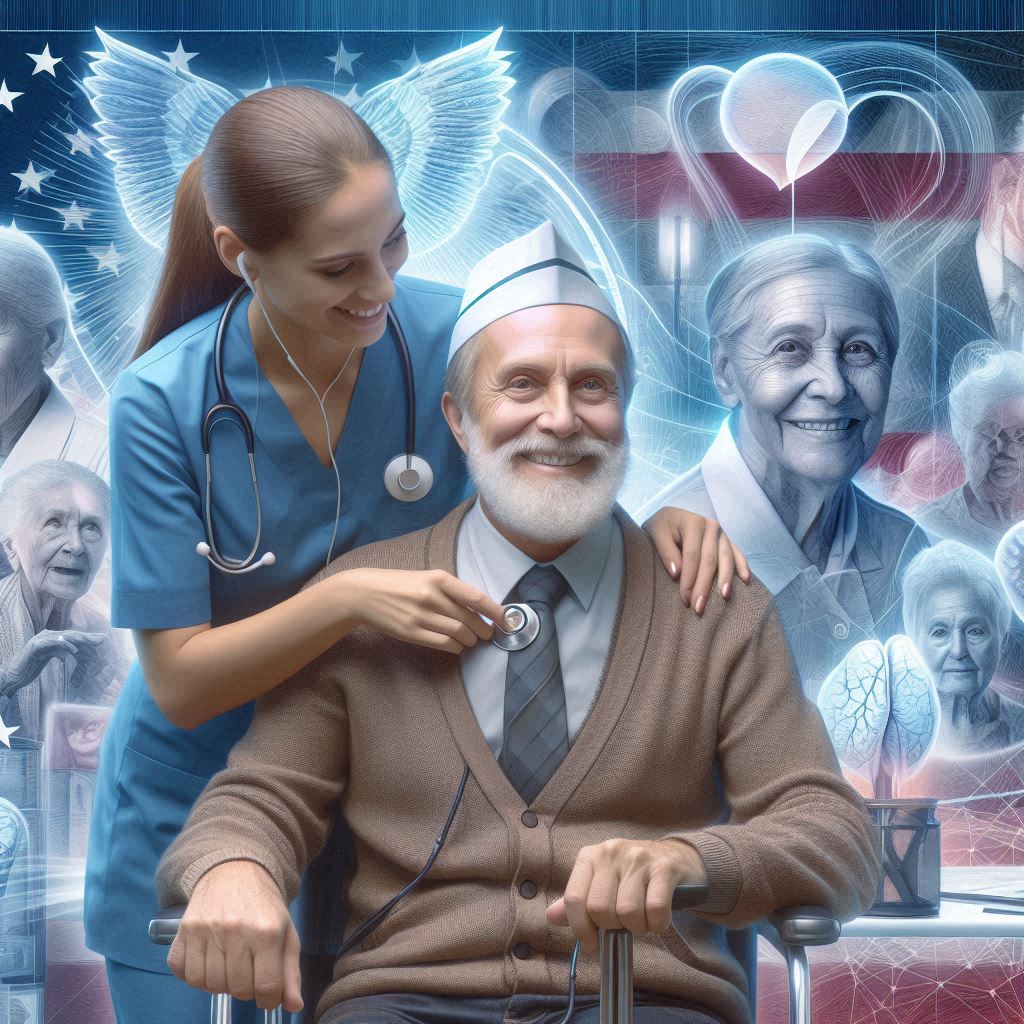Introduction
The Role of Registered Dietitians in Healthcare
Registered dietitians (RDs) are pivotal members of healthcare teams, specializing in nutrition assessment, counseling, and education.
They play a critical role in promoting health and managing chronic conditions through personalized dietary interventions.
RDs collaborate with physicians, nurses, and other healthcare professionals to ensure holistic care that addresses nutritional needs across various life stages.
Transition into the Specific Impact of Registered Dietitians in Geriatric Care
In geriatric care, RDs wield their expertise to address the unique nutritional challenges faced by older adults.
Aging often brings changes in metabolism, dietary requirements, and health conditions like diabetes or cardiovascular disease.
RDs work closely with elderly patients to optimize nutrient intake, manage chronic illnesses, and support healthy aging.
Their interventions aim to enhance quality of life, maintain functional independence, and prevent or manage nutrition-related complications common in older populations.
RDs educate caregivers and family members, empowering them to offer appropriate nutritional support for elderly individuals’ comprehensive care.
Importance of Nutrition in Aging
Significance of proper nutrition in aging adults
Proper nutrition holds profound importance for aging adults, profoundly influencing their health and quality of life.
As individuals age, nutritional needs change, requiring a focus on nutrient-dense foods that support overall well-being.
Adequate nutrition helps maintain muscle mass, bone density, and immune function, crucial for maintaining independence and reducing the risk of illness and injury.
How nutrition impacts overall health and wellbeing in the elderly population
Nutrition impacts every facet of health and well-being in the elderly. A balanced diet rich in vitamins, minerals, and antioxidants supports immune function, helping to ward off infections and chronic diseases prevalent among older adults.
Nutrients like calcium and vitamin D contribute to bone health, reducing the risk of fractures and osteoporosis. Protein intake supports muscle strength and function, preserving mobility and reducing the likelihood of falls.
Cognitive health is also closely linked to nutrition. Omega-3 fatty acids, found in fish and nuts, are beneficial for brain function and may help mitigate cognitive decline.
Antioxidant-rich foods, such as berries and leafy greens, protect against oxidative stress and support mental acuity. Conversely, diets high in saturated fats and sugars have been associated with an increased risk of cognitive impairment and dementia.
Cardiovascular health benefits significantly from a nutritious diet. Fiber-rich foods, like whole grains and legumes, help manage cholesterol levels and support heart function.
Potassium-rich foods, such as bananas and spinach, help regulate blood pressure, reducing the risk of cardiovascular disease. Healthy fats, like those found in avocados and olive oil, contribute to heart health by reducing inflammation and improving cholesterol profiles.
Digestive health is another area influenced by nutrition in aging adults. Fiber and adequate hydration promote regular bowel movements, preventing constipation and maintaining gut health.
Probiotics, found in yogurt and fermented foods, help maintain a balanced gut microbiome critical for digestion and nutrient absorption.
Read: How Genetic Counseling Improves Patient Care
The Role of Registered Dietitians in Geriatric Care
When it comes to geriatric care, registered dietitians play a crucial role in ensuring the health and well-being of elderly patients. Their responsibilities are extensive and varied, encompassing both nutritional assessment and personalized dietary planning.
Responsibilities of Registered Dietitians in Geriatric Care
- Conducting thorough nutritional assessments to identify any deficiencies or special dietary needs.
- Developing individualized meal plans that take into account any medical conditions or medications.
- Educating patients and their families about the importance of proper nutrition in aging.
- Monitoring and adjusting dietary plans based on the patient’s response and progress.
- Collaborating with other healthcare professionals to ensure a comprehensive approach to care.
- Advocating for the nutritional needs of elderly patients in healthcare settings.
Registered dietitians bring a unique set of expertise and knowledge to the care of older adults. With their specialized training in nutrition and aging, they are able to address the specific challenges and concerns that elderly patients may face.
Expertise and Knowledge of Dietitians in Geriatric Care
- Understanding the nutritional requirements of older adults, including changes in metabolism and nutrient absorption.
- Knowledge of common age-related conditions that can impact dietary needs, such as osteoporosis or diabetes.
- Ability to develop meal plans that are not only nutritious but also appealing to older taste preferences.
- Skill in addressing barriers to proper nutrition, such as difficulty chewing or swallowing.
- Awareness of the latest research and guidelines on nutrition for older adults.
In review, registered dietitians play a vital role in geriatric care by providing personalized and evidence-based nutrition services to elderly patients.
Their expertise and knowledge help to promote optimal health and quality of life in this population, ensuring that older adults receive the attention and support they need to thrive in their later years.
Read: Genetic Counseling for Inherited Disorders
Individualized Meal Planning
How registered dietitians create personalized meal plans for elderly patients
Registered dietitians (RDs) employ a systematic approach to create personalized meal plans that cater specifically to the nutritional needs of elderly patients.
Beginning with a thorough assessment, RDs evaluate factors such as the patient’s medical history, current health status, dietary preferences, and any existing health conditions.
This assessment provides a comprehensive understanding of the individual’s nutritional requirements and forms the basis for developing tailored meal plans.
When creating meal plans, RDs consider daily nutrient intake recommendations for vitamins, minerals, and protein. These nutrients prevent common deficiencies in aging adults.
They also take into account factors like hydration needs and portion sizes to ensure meals are balanced and meet the specific dietary goals of each patient.
Importance of considering dietary restrictions and health conditions in meal planning
In meal planning for elderly patients, RDs emphasize the critical importance of addressing dietary restrictions and health conditions to optimize nutritional intake and support overall well-being.
Dietary restrictions may include allergies, intolerances, or cultural preferences that require careful consideration to ensure meals are safe and enjoyable for the patient.
Health conditions such as diabetes, hypertension, cardiovascular disease, and gastrointestinal disorders significantly impact dietary requirements.
RDs tailor meal plans to manage these conditions effectively, incorporating foods that support disease management while promoting overall health.
For example, they may recommend a low-sodium diet for patients with hypertension or a carbohydrate-controlled diet for those with diabetes.
RDs integrate patient-specific needs with evidence-based guidelines to ensure sustainable, adequate meal plans for elderly patients.
They educate patients and caregivers on the rationale behind dietary recommendations, empowering them to make informed choices and adopt healthier eating habits.
Read: How Genetic Counselors Help with Rare Diseases

Nutritional Education and Counseling
How dietitians provide education and counseling to seniors about healthy eating habits
Registered dietitians are instrumental in providing comprehensive education and counseling to seniors regarding healthy eating habits.
They begin by conducting thorough assessments of each individual’s nutritional needs, taking into account medical history, dietary preferences, and any existing health conditions.
This personalized approach allows dietitians to tailor their advice and recommendations to suit the unique circumstances of each senior.
Through one-on-one counseling sessions, dietitians educate seniors about the importance of balanced nutrition in maintaining overall health and well-being.
They clarify how nutrients support bodily functions and address nutritional concerns linked to aging, like bone, heart, and cognitive health.
By providing clear and evidence-based information, dietitians empower seniors to make informed decisions about their dietary choices.
Transform Your Career Today
Unlock a personalized career strategy that drives real results. Get tailored advice and a roadmap designed just for you.
Start NowDietitians also play a crucial role in helping seniors navigate dietary restrictions and food allergies.
They offer practical strategies for meal planning, grocery shopping, and preparing nutritious meals that meet individual dietary needs.
This guidance ensures that seniors can maintain a healthy diet while managing specific health conditions or dietary preferences.
Role of dietitians in helping older adults make informed food choices
Dietitians critically assist older adults in making informed food choices by equipping them with necessary nutrition knowledge and skills.
They educate seniors on how to interpret nutrition labels, understand portion sizes, and identify nutrient-dense foods that support their health goals.
Dietitians stress the importance of including a variety of fruits, vegetables, whole grains, lean proteins, and healthy fats.
In addition to providing nutritional education, dietitians assist older adults in managing dietary restrictions and special dietary needs.
They tailor meal plans for seniors with allergies, intolerances, or conditions like diabetes, hypertension, or kidney disease.
Dietitians also provide guidance on navigating food interactions with medications, ensuring that dietary choices are safe and supportive of overall health.
Read: Genetic Testing and Counseling: An Overview
Discover More: How to Become an Orthopedic Technologist: Steps & Tips
Monitoring and Evaluation
How registered dietitians monitor the nutritional status of geriatric patients
Registered dietitians (RDs) monitor geriatric patients’ nutritional status through regular assessments and evaluations.
They conduct comprehensive reviews of dietary intake, weight trends, biochemical markers, and physical health indicators to track changes in nutritional health over time.
RDs use tools like food diaries, dietary recall interviews, and nutritional screening tools to gather data on patients’ eating habits and nutritional intake.
These assessments help identify deficiencies, excesses, or imbalances in nutrient consumption that may impact overall health and well-being.
Importance of evaluating the effectiveness of dietary interventions in improving health outcomes
Evaluating the effectiveness of dietary interventions is crucial for optimizing health outcomes in geriatric patients. RDs analyze data collected during monitoring to assess the impact of dietary changes on patients’ nutritional status, disease management, and quality of life.
By comparing baseline measurements with ongoing assessments, RDs identify improvements or areas needing adjustment in dietary plans. They consider factors such as patient adherence, nutritional goals achieved, and changes in health status to tailor interventions effectively.
Continuous evaluation allows RDs to refine dietary recommendations based on individual responses and evolving health needs.
This adaptive approach ensures dietary interventions respond to aging dynamics and support long-term health and disease prevention.
Moreover, RDs collaborate closely with healthcare teams and caregivers to discuss findings and coordinate multidisciplinary care. They provide education and support to empower patients and caregivers in implementing dietary recommendations effectively.
Collaborative Care Approach
Collaborative care in geriatric settings involves a team of healthcare professionals working together to address the complex needs of older adults. This approach recognizes that older adults often have multiple chronic conditions and require a holistic approach to their care.
Benefits of a Multidisciplinary Approach
- Comprehensive care: By involving dietitians in the care of older adults, healthcare teams can address not just medical issues, but also dietary and nutritional needs.
- Improved outcomes: Research has shown that collaboration among healthcare professionals, including dietitians, can lead to better health outcomes for older adults, such as reduced hospitalizations and improved quality of life.
- Individualized care: Dietitians play a crucial role in tailoring nutrition plans to meet the specific needs of older adults, taking into account their unique health conditions and dietary preferences.
Collaboration with Other Healthcare Professionals
- Interdisciplinary team meetings: Dietitians participate in team meetings with physicians, nurses, therapists, and other healthcare professionals to discuss the individual needs of older adults and develop care plans.
- Communication and coordination: Dietitians communicate regularly with other team members to ensure that nutrition interventions are integrated seamlessly into the overall care plan for older adults.
- Education and support: Dietitians provide education and support to other healthcare professionals on the importance of nutrition in the health and well-being of older adults, fostering a collaborative approach to care.
In general, the collaborative care approach in geriatric settings, which includes the active involvement of registered dietitians, plays a vital role in providing comprehensive and individualized care for older adults.
By working together as a team, healthcare professionals can improve outcomes and enhance the quality of life for older adults.
Find Out More: Medical Transcriptionist Job Outlook 2024
Conclusion
Registered dietitians play a pivotal role in enhancing the health and well-being of aging adults through personalized nutrition interventions.
By tailoring dietary plans to meet specific health needs, dietitians ensure that seniors receive optimal nourishment, supporting overall physical and cognitive function.
They educate elderly individuals and caregivers about balanced nutrition, promoting habits for longevity and vitality.
In geriatric care, dietitians modify diets for conditions like diabetes, hypertension, and cardiovascular disease in collaboration with healthcare teams.
This collaborative approach helps prevent complications and improves quality of life for seniors.
By addressing nutritional deficiencies and promoting adequate hydration, dietitians enhance seniors’ resilience to illnesses and support their immune function.
Dietitians go beyond meal planning to educate aging adults on portion control, food safety, and tailored dietary supplements.
Through their expertise and advocacy, dietitians empower seniors to make informed food choices that promote independence and overall wellness.
[E-Books for Sale]
The Big Book of 500 High-Paying Jobs in America: Unlock Your Earning Potential
$19.99 • 500 High-Paying Jobs • 330 pages
Explore 500 high-paying jobs in America and learn how to boost your career, earn more, and achieve success!
See All 500 High-Paying Jobs of this E-Book
1001 Professions Without a Degree: High-Paying American Jobs You Can Start Now
$19.99 • 1001 Professions Without a Degree • 174 pages
Discover 1001 high-paying jobs without a degree! Unlock career tips, skills, and success strategies for just $19.99!




